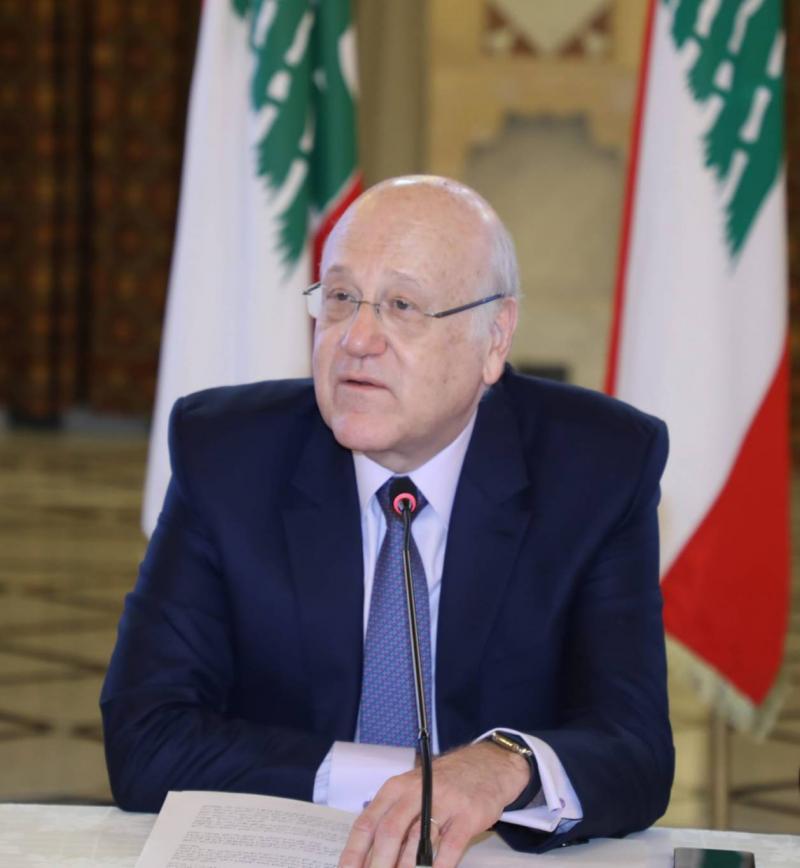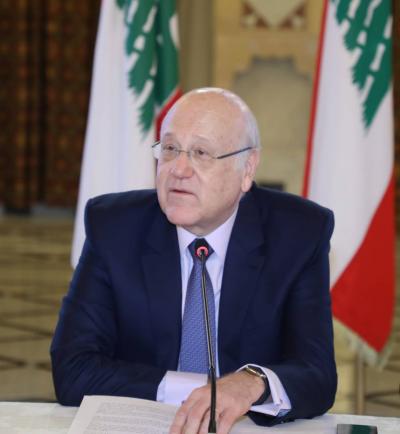Caretaker Prime Minister Najib Mikati pointed out that "Lebanon's relations with many countries, especially those of the Gulf Cooperation Council, have been shaken over the past years due to grave abuses that came at a high cost, and we will not allow them to be repeated." He reiterated "the commitment to protecting our security and that of brotherly and friendly countries, preventing any wrongdoing towards those who have never abandoned Lebanon, or the export of contraband to them and harming their societies, with the Kingdom of Saudi Arabia being foremost among these countries."
Mikati's remarks came during a roundtable he chaired on enhancing supply chain security in Lebanon through a container monitoring program, as part of the government's plan to combat drug smuggling and prohibited substances through ports. The meeting was held at the Grand Serail, organized by the Lebanese government and the United Nations Office on Drugs and Crime, and included the participation of several ministers and foreign ambassadors.
In his address, Mikati stated, "Our meeting today is to discuss the progress made so far under the 'UNODC/CCP' program and to advance it to the next level with a clear vision and ambitious goals aimed at taking all necessary measures to make our commercial supply chain safer." He added that "by examining exported and imported containers to ensure their safety and freedom from prohibited items, Lebanon will be able to restore its full export activities, especially fruits and vegetables to Arab markets, particularly the Gulf countries."
He emphasized that "through the principle of inter-agency cooperation that the program promotes, Lebanon sends a clear message that it prioritizes combating corruption and that our commitment to improving border security and contributing to regional stability will send a strong signal to the international community, which will help us in our economic revival efforts through negotiations with the International Monetary Fund and international partners." He underscored that the meeting "signals an expansion of cooperation between the United Nations Office on Drugs and Crime and the relevant ministries, allowing law enforcement agencies to join this successful program."
Mikati expressed gratitude to "the countries that have generously provided us with assistance to monitor public facilities, such as France, Britain, and Italy, and especially thanked today the ambassadors of Australia, Germany, and Norway for their support of the project we are launching today." He added, "I know you have been very patient with us thus far and I hope you will continue to invest in this important program for Lebanon and the entire Middle East. Rest assured that you have our full support to make this program successful."
He reaffirmed that "this program can enhance investor confidence, contribute to economic growth, and improve job opportunities. In short, it is a step that can help Lebanon reposition itself as a commercial center in the Eastern Mediterranean and overcome long, complicated crises."
**Remarks from Representatives:**
In her speech, Christina Al-Bartin stated that "today's meeting is highly significant due to the volume of maritime container traffic, with around 750 million containers shipped annually in the commercial supply chain, along with complex routes and smuggling methods used by drug traffickers and other smugglers, making interception methods challenging." She pointed out that "to confront this danger, the container monitoring program aims to build the capacities of member states to improve their ability to manage risks, ensure the security of the supply chain, and facilitate trade at maritime ports, airports, and border crossings to prevent cross-border crime and smuggling of illegal goods."
Wolfgang Agner highlighted the advanced stages of cooperation with Lebanon and reviewed what has been implemented with Lebanese customs at ports, airports, and land borders, indicating that "the program talks about secure borders and risk analysis, which can lead to a new vision for Lebanon in this area."
Norwegian Ambassador Martin Ytrefik remarked that this program impacts Lebanon's stability and prosperity, noting, "We see border management crises in Lebanon as an example of the difficulties Lebanon may face in the commercial field."
Australian Ambassador Andrew Barnes announced that "countries must adopt effective measures to monitor their borders, and this implemented program enables Lebanon to work better and mitigate risks in goods trade and service provision." German Deputy Ambassador Katerina Lack stated that "the project contributes to strengthening commitment to tasks, assuming responsibilities, financing goods supply, and supporting Lebanon's sovereignty and capability to monitor its borders, which enhances operations at the port, airport, and borders, all of which have been focal points for civil society."
**Meeting with the World Bank:**
Mikati also met with a delegation from the World Bank, including "the Vice President for the Middle East and North Africa, Ferid Belhaj, and the Regional Director for the Middle East and North Africa, Jean Christophe Carre," where joint cooperation projects were discussed.




